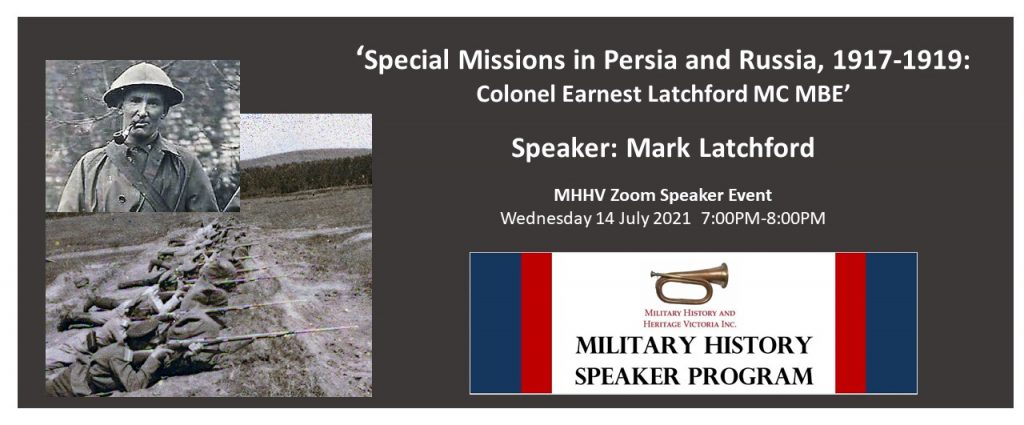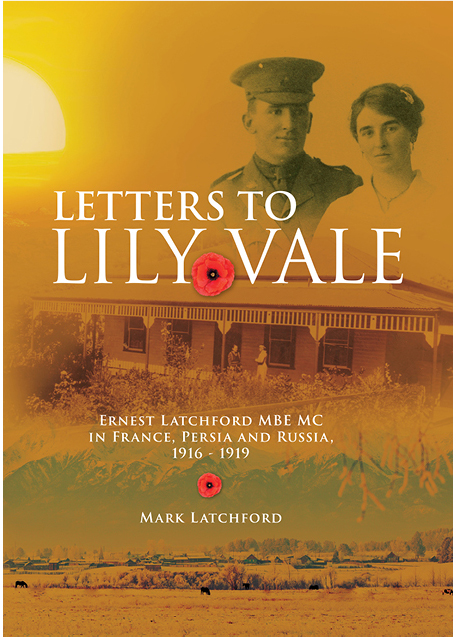Mark Latchford opened his excellent presentation to an audience of 26 explaining that he inherited his grandfather’s (Ern) trunk of several hundred letters written to his fiancé during WWI.

Ern wrote every Sunday night he was away at the war from the time he left Port Melbourne to the time he left Russia four years later. These letters provided a huge insight to Ern’s lived experience because they were incredibly detailed and were a nearly complete series. They were accompanied by photographs. Both the letters and photographs formed a foundation for the book. Given the frank and forthright content, Mark was surprised Ern’s letters got through the censors.
Mark’s grandfather, born 1889, was one of 10 children of dirt-poor parents of Anglo-Irish stock living in a dysfunctional family in a rude cottage beside the Goulburn Weir. Ern’s father was an itinerant stonecutter. With his father wandering western NSW seeking work, the family fell into disarray and the children were dispersed to various relatives or sent to do menial work. Ern was fostered out to an uncle from the age of 3 and variously lived in Deniliquin, Echuca & Launceston and Melbourne. Victoria. (His father was killed by a bullock dray not long after). He joined the militia via cadets and by 1914, when the war broke out, Ern had become a training officer and as such worked close to Pompey Elliott amongst others. Despite his belief that the war would be long and bloody, he wanted to fight but was frustrated to be kept in Australia training new recruits.
Finally, late 1916, after 18 months of lobbying hard to get into battle, he was sent with the 38th Battalion, firstly to England and then on to the Western Front. The 38th was posted to a quieter sector on the front and rotated in and out of the line. When in the line he was engaged in numerous raids through no-man’s-land. Later Ern was involved with the 38th in the Battle of Messines (which he considered well organised) and the Battle of Passchendaele (which he considered chaotic). During Passchendaele he led his platoon forward in attack. Most of his fellow officers were obliterated in that charge. Ern earned a Military Cross by consolidating the surviving men and bringing them back over the 100 yards for which they had lost so much. He lost his brother-in-law and a former batman at Passchendaele.
In early 1918, Ern volunteered for the Dunsterforce. Dunsterforce was an Allied military unit named after its commander, General Lionel Dunsterville, the role model for Kipling’s character Stalky. The force was intended to organise local units in northern Iran (Persia) and southern Caucasus to replace the Tsarist armies that had collapsed under Bolshevism to fight the Ottoman armies. It was also intended to stop an Ottoman push east to India as well as to protect the British oil interests in Kuwait that fuelled their war efforts. But with fewer than 350 Australian, New Zealand, British and Canadian officers and NCOs, the force was pitifully small.
Ern travelled with Dunsterforce from England to France, then by ship to Egypt under an escort of Japanese destroyers. Then by another ship to Basra and up the Tigris River by flat bottomed boat to Baghdad. They then followed Dunsterforce into Persia where he found the nation in chaos, awash with refugees and in famine exacerbated by corruption in the government.
Dunsterville and much of the force, along with reinforcements from the 39th Infantry Brigade, made their way to Baku (in Russia) with 500 Ford vans and armoured cars. There they fought the Battle of Baku from 26 August to 14 September 1918. They were evacuated by sea, before it was overcome firstly by Turks and later by Bolsheviks.
Meanwhile, part of the Dunsterforce under Australian Captain Stanley Savige was particularly concerned with rescuing Assyrians and Armenians to prevent them being massacred by the Ottomans and local warlords.
Ern remained in the rear in hot uncomfortable conditions tasked with recruiting Armenians and Syrians to turn them into a guerrilla force. One of his biggest tasks became feeding refugees. In any event, the guerrilla force he was training proved redundant as the Ottoman empire imploded and their soldiers withdrew.
When Dunsterforce was disbanded, the Australians were expected to find their way to India and then home. Despite having a fiancé to go home to, Ern volunteered to go to Siberia to train White Russians to fight Bolsheviks. The journey to Siberia provided a welcome opportunity for Ern to socialise after the strictures of war. Ern travelled via India, Sri Lanka, Singapore, Hong Kong, Japan, Vladivostok and the trans-Siberian railway to Irkutsk catching up with expatriates along the way. The final rail trip went several thousand miles along the congested single line trans-Siberian railway, while Ern and his fellow travellers moved in or on top of old American box cars. Other nationals going west included Americans, Canadians and British. They were spread out along the line right across Siberia while a substantial number of Czech ex-POWs of the allies, blocked from going west, drifted east to get home via Canada.
Irkutsk at that time was a mix of peasants and various refugees that had fled east. At the time the town wasn’t under great threat although there were frequent rather chaotic guerrilla attacks on the railway close by. The town was also visited at irregular intervals by horse mounted Cossacks who called in for ammunition and other supplies.
Ern stayed in Irkutsk for most of 1919. When the snow melted and the climate became hot, humid and mosquito infested, he made camp out of town with a rifle range built for training. With Irkutsk was not under immediate threat, he had time for hunting and ball games.
This semi-idyll ended in late 1919 when Trotsky’s Bolsheviks arrived and slaughtered any White Russians they found. Captain Ern Latchford, like the other non-nationals, headed home.
At home at last, Ern stayed in the military. He took a demotion from captain to warrant officer and deployed to the School of Musketry, which then became the Small Arms School in Randwick. Ern spent most of his career at the School, eventually becoming the chief instructor and then CEO. He received and MBE in 1938 for services to military training. He retired from the School and the Army in 1949, he then worked as a Supreme Court Associate for some years and died in November 1962 in Heidelberg Victoria.
How to buy books

Persia and Russia, by Mark Latchford, Openbook Howden, 2020: ISBN 9780648845621.
The book can be purchased via Letters to Lily Vale | Openbook Howden Print & Design https://www.openbookhowden.com.au/product/letters-to-lily-vale/
or from the author: Mark_Latchford@hotmail.com
About the presenter
Mark Latchford was born in Canberra and is a graduate of the University of Sydney with a Bachelor of Arts (Modern History, Political Science, Economic Geography). He had a successful corporate career with the IBM Corporation, including senior executive roles in Australia, Japan, France and Hong Kong. Post retirement, he consults in the public and private sector while pursuing his passion for history, biography and adventure travel. Mark has travelled to over 130 countries, which included research for “Letters to Lily Vale”.
Contact Brent D Taylor about this article.






